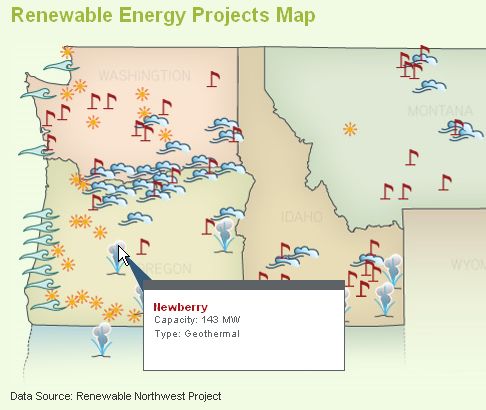Geothermal Power in Oregon
<< Back to: Green industry <<
Geothermal comes from the Greek words meaning earth heat, explains the Oregon Department of Energy. Oregon ranks 5th among states in the number of geothermal projects being developed, and has 9 geothermal projects in production.

GreenPowerOregon.com has a map of renewable energy projects in the state.
Geothermal power plants make electricity by using wells to pipe underground steam and hot water to the surface, where it is converted into electricity. Geothermal energy is derived by harnessing the heat from the earth’s core. Magma typically remains below the earth’s crust, heating nearby rock and water to near 700 degrees F.
More typically, geothermal is used by buildings to moderate temperatures. Pipes that go down several hundred feet can tap into a more moderate 50 degree environment and extract heat or coolant using heat exchangers.
There is no generation of electricity from geothermal sources within the state of Oregon. However, there are several sites where geological data suggest a resource sufficient for power generation may exist. The potential for production of electricity from Oregon´s geothermal resources has been explored at three sites in Oregon. The DOE in February finalized a $96.8 million loan guarantee to U.S. Geothermal to support their geothermal power project in Malheur County, Eastern Oregon.
The city of Klamath Falls uses geothermal energy directly to supply heat for a district heating system. Geothermal heat sources in several other Oregon counties supply heat to buildings, swimming pools, resorts and industrial uses.

The Port of Portland headquarters is Gold certified and uses geothermal pipes to supplement heating (above)
Geothermal energy production could triple over the next few years expanding from nine to 15 states, according to the Geothermal Energy Association. The total installed capacity of the U.S. is approximately 3,102 MW, enough to power over 2 million homes.
<< Back to: Green industry <<